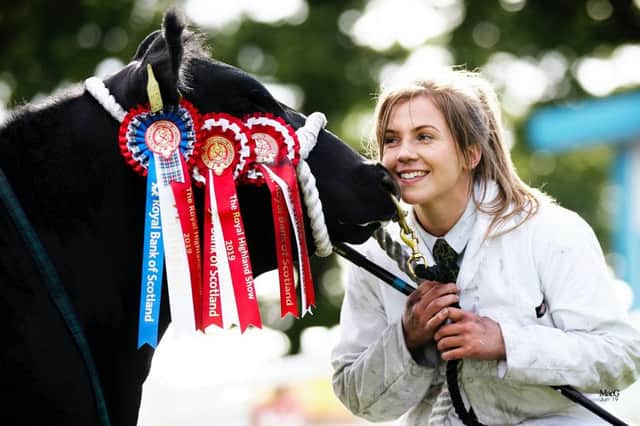Alan Laidlaw: Women sowing the seeds of change in male tradition of farming


According to the Scottish Agricultural Census 2018, 66,600 people work in our sector, and more than a third, 38 per cent, are female. This demonstrates that women continue to carve rewarding careers in agriculture and this must be encouraged as the sector struggles to attract and retain young talent.
As the organisation representing more than 16,000 farmers in Scotland, and the organisation behind the Royal Highland Show, we see first hand the fantastic contribution that women make to the sector. From breeding the finest livestock, to running successful arable farms and pioneering diversification, women are an important part of the skills gap solution that ensures we cultivate a thriving and sustainable future.
Advertisement
Hide AdAdvertisement
Hide AdAs part of the RHASS’s charitable remit to promote and protect the interests of farmers in Scotland, we have long championed inclusivity in our industry.
From the provision of grants and awards, to celebrating success and having a long-running strength of women on the RHASS board – who were the early pioneers of the thriving Women in Agriculture group – we continue to ensure that the contribution of women to the industry is promoted and celebrated at every turn.
However, more needs to be done. A recent report by the Women in Agriculture task force set up by the Scottish Government has found that women’s contribution to the industry can be undervalued, downplayed, or simply go unseen.
A series of recommendations have been put forward that aim to ensure that not only do women have access to skills development opportunities to enable them to succeed in their business, but that they are also given the opportunities to progress in the workplace with suggestions that there should be quotas to boost the representation of women on farms.
Clearly, this is an issue for the sector, and we must work hard to root out sexism and prejudice. Our industry is not alone. Whilst there has been some progress in advancing women in leadership across all sectors, a lot remains to be done – a quarter of the FTSE 350 have only one woman on their board.
As a traditional profession, we are challenging historical cultural views that held men as the heirs to agricultural businesses. However, as technology, artificial intelligence and robotics is driving a fundamental shift away from the physicality of the role, we are now seeing more women leading strong farming businesses. However, for those of us in the sector, we know this has been the case for decades – it just often goes unseen.
Clearly, limiting the opportunities for women can only limit the opportunities for our sector overall and to remain a thriving industry, talent and enthusiasm are required in whatever form they come.
It is well known that increasing the diversity of perspectives has been shown to improve decision-making, with studies revealing that women approach problems in different ways from men and are naturally more collaborative and generally better communicators. Our industry can suffer from a disconnect between producer and consumer, so having strong communication skills and a willingness to engage is becoming even more important.
Advertisement
Hide AdAdvertisement
Hide AdWithout doubt the best advocates for women are other women – mentors who act as role models for those starting a career in our industry, which is why RHASS and its industry partners are championing those women who have created the opportunity for advancement in our industry.
The RHASS programme of grants and awards is designed to provide inspiration and opportunity to all those, whether male or female, in the earliest stages of their career so they can shape their own futures.
The issues facing agriculture have a substantial impact on people and the planet, so we need to cultivate the ideas and talents of everyone, regardless of gender, to solve these issues and to celebrate the successes throughout our rich industry. Scotland has the answers to some of the food challenges we currently face, so we need to get that positive story out there.
Our industry has seen significant changes over the past few decades and the rate of change continues to accelerate. We need the brightest people in positions of power to drive sustainable change.
This is why RHASS will continue to celebrate the influence of the women shaping the future of farming and showcase the incredible opportunities available to all those who join the farming community.
Alan Laidlaw, chief executive at RHASS.